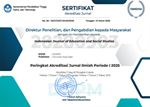Alawamleh, M., Al-Twait, L. M., & Al-Saht, G. R. (2022). The effect of online learning on communication between instructors and students during Covid-19 pandemic. Asian Education and Development Studies, 11(2), 380–400. https://doi.org/10.1108/AEDS-06-2020-0131
Aluko, R., & Ooko, M. (2022). Enhancing the Digital Literacy Experience of Teachers to Bolster Learning in the 21st Century. Journal of Learning for Development, 9(3), 420–435. https://doi.org/10.56059/jl4d.v9i3.662
Bakhtiar, H. A., Abu, R., & Shaifuddin, N. (2024). Sustainable Collaboration Between Public Libraries and School Resource Centers: Advancing Digital Information Literacy in the Digital Age. Journal of Information and Knowledge Management, 14(2), 50–60. https://doi.org/10.24191/jikm.v14i2.4467
Bonett, S., Sweeney, A., Li, Q., Watson, D. L., Bauermeister, J., Hernandez, B., Williams, J., & Brady, K. A. (2025). Facilitators and Barriers to Equitable Implementation of Telehealth PrEP Delivery: A Qualitative Descriptive Study of Program Staff and Stakeholders. Health Promotion Practice, XX(X), 1–12. https://doi.org/10.1177/15248399251347253
Buckingham, D. (2015). Defining digital literacy: What do young people need to know about digital media? Nordic Journal of Digital Literacy, 10(Jubileumsnummer), 21-34.
https://doi.org/10.18261/ISSN1891-943X-2015-Jubileumsnummer-03
Budiati, R., Suharini, E., Kurniawan, E., & Santoso, A. B. (2025). Enhancing High School Geography Learning through a TikTok-Based E-Module on Flood Disaster Mitigation. Jurnal Pendidikan Progresif, 15(2), 1112–1125. https://doi.org/10.23960/jpp.v15i2.pp1112-1125.
Lestari, S., & Nugraheni, A. S. (2022). The Effect of Google Classroom in Improving Learning Motivation and Critical Thinking Skills of University Students. AL-ISHLAH: Jurnal Pendidikan, 14(1), 61–70. https://doi.org/10.35445/alishlah.v14i1.973
Listanto, V., Arlinwibowo, J., Permatasari, A. D., Iftitah, K. N., & Anwas, E. O. M. (2025). Which is Better: E-Book or Printed Book? A Meta-Analysis of Educational Materials in Language Learning. International Review of Research in Open and Distributed Learning, 26(3), 170–192. https://doi.org/10.19173/irrodl.v26i3.8468
Livingstone, S. (2014). Developing social media literacy: How children learn to interpret risky opportunities on social network sites. Communications, 39(3), 283-303.
https://doi.org/10.1515/commun-2014-0113
Majola, M. X., & Mudau, P. K. (2022). Lecturers’ Experiences of Administering Online Examinations at a South African Open Distance e-Learning University During the COVID-19 Pandemic. International Journal of Educational Methodology, 8(2), 275–283. https://doi.org/10.12973/ijem.8.2.275
Mamabolo, M. J., & Durodolu, O. O. (2023). Rural accessibility to digital libraries: requirements and challenges. Digital Library Perspectives, 39(4), 551–570. https://doi.org/10.1108/DLP-04-2023-0025
Mariam Bibi, Tahira Rafiq, & Muhammad Rashid. (2025). Need Analysis of Pakistani English Teachers Teaching at University Level: A Study of Skills and Digital Collaboration. Journal of Arts and Linguistics Studies, 3(1), 165–193. https://doi.org/10.71281/jals.v3i1.217
Martínez-Bravo, M. C., Chalezquer, C. S., & Serrano-Puche, J. (2022). Dimensions of Digital Literacy in the 21st Century Competency Frameworks. Sustainability (Switzerland), 14(3). https://doi.org/10.3390/su14031867
Martin, A. (2006). Literacies for the digital age. In A. Martin & D. Madigan (Eds.), Digital literacies for learning (hlm. 3-25). London: Facet Publishing.
https://doi.org/10.29085/9781856049870.003
Ng, W. (2012). Can we teach digital natives digital literacy? Computers & Education, 59(3), 1065-1078.
https://doi.org/10.1016/j.compedu.2012.04.016
Nguyen, L. A. T., & Habók, A. (2024). Tools for assessing teacher digital literacy: a review. In Journal of Computers in Education (Vol. 11, Issue 1). Springer Berlin Heidelberg. https://doi.org/10.1007/s40692-022-00257-5
OECD. (2021). 21st-century readers: Developing literacy skills in a digital world. Paris: OECD Publishing.
https://doi.org/10.1787/a83d84cb-en
Prensky, M. (2001). Digital natives, digital immigrants. On the Horizon, 9(5), 1-6.
https://doi.org/10.1108/10748120110424843
Purwanto, M. B., Hartono, R., & Wahyuni, S. (2023). Essential Skills Challenges for the 21st Century Graduates: Creating A Generation of High-Level Competence in The Industrial Revolution 4.0 Era. Asian Journal of Applied Education (AJAE), 2(3), 279–292. https://doi.org/10.55927/ajae.v2i3.3972
Shak, M. S. Y., Hasni, N. A., Abdul Malik, N., & Mohd Tahir, M. H. (2022). The use of Google Classroom among Students during the COVID-19 Pandemic: A Review. International Journal of Emerging Technology and Advanced Engineering, 12(8), 36–44. https://doi.org/10.46338/ijetae0822_05
Timotheou, S., Miliou, O., Dimitriadis, Y., Sobrino, S. V., Giannoutsou, N., Cachia, R., Monés, A. M., & Ioannou, A. (2023). Impacts of digital technologies on education and factors influencing schools’ digital capacity and transformation: A literature review. In Education and Information Technologies (Vol. 28, Issue 6). Springer US. https://doi.org/10.1007/s10639-022-11431-8
Udeogalanya, V. (2022). Aligning digital literacy and student academic success: Lessons learned from COVID-19 pandemic. International Journal of Higher Education Management, 08(02), 54–65. https://doi.org/10.24052/ijhem/v08n02/art-4
Wilson, A. Q., Wombles, C., Heidel, R. E., & Grabeel, K. L. (2022). The status of scholarly efforts of librarians on health literacy: a bibliometric analysis. Journal of the Medical Library Association, 110(2), 166–173. https://doi.org/10.5195/jmla.2022.1253
Yuliana, D., Ramdaniah, P., Bayani, F., Bimmaharyanto, E., Lupitaningrum, D. M., & Abstrak, S. A. (2021). Lensa: Jurnal Kependidikan Fisika. 9(1), 1–11. https://doi.org/10.33394/j
 (Sekolah Tinggi Ilmu Tarbiyah Darul Ulum Kotabaru)
(Sekolah Tinggi Ilmu Tarbiyah Darul Ulum Kotabaru) 



